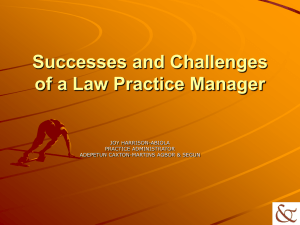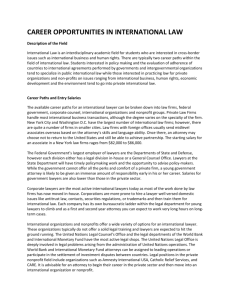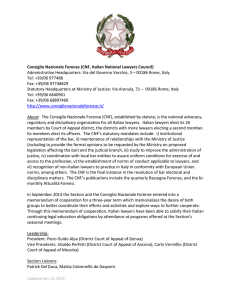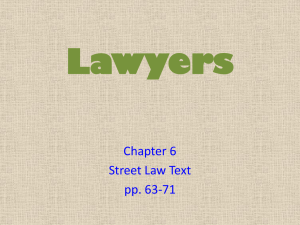Finding a Law Firm Culture that Works
advertisement
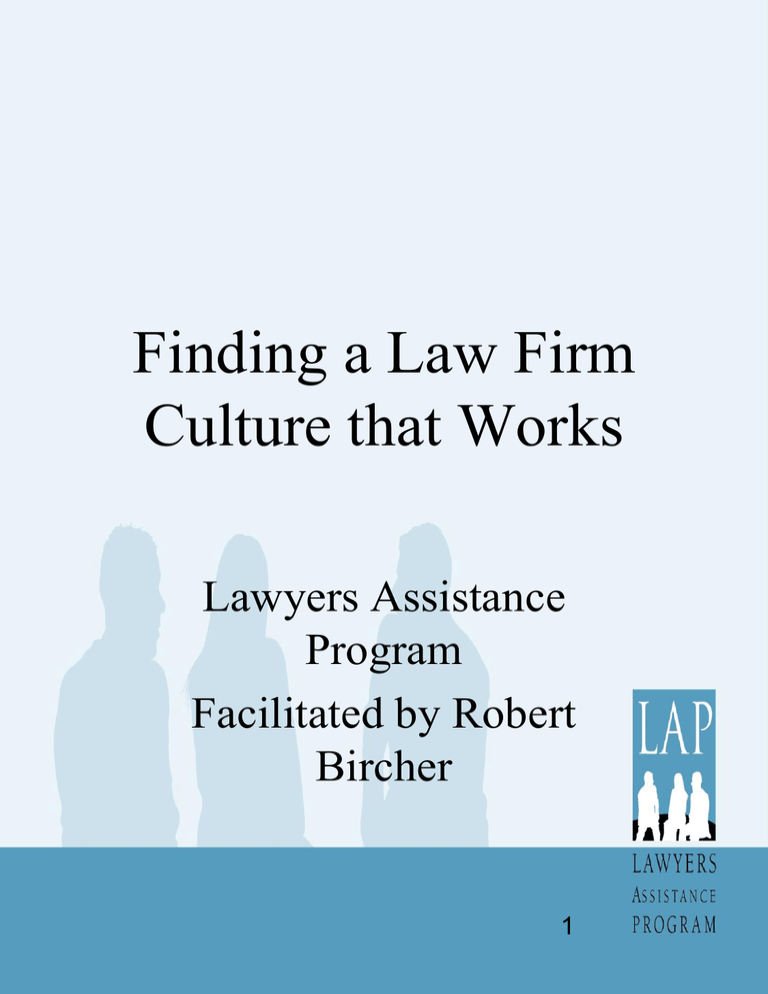
Finding a Law Firm Culture that Works Lawyers Assistance Program Facilitated by Robert Bircher 1 What is Law Firm Culture? • Any group of people that engages in some activity together will have a set of values, conventions, and ways of being that are unique to that particular group-Lawyers are no exception • There are general cultures such as Government, Corporate Counsel, & Private Practice and of course many subdivisions of thoseSmall/Solo firms, mid-size firms and Big firms-all with very different cultures 2 All Cultures are Different • In the same way that ethnographic cultures are very different, so too are law firm cultures. • The type of culture that you chose is extremely important, especially from an enjoyment or lifestyle point of view • For many Lawyers the culture is at least as important as the area of law that you practice 3 Significance of Culture • From the point of view of lifestyle your choice of culture will make a huge difference in your mental health and enjoyment of Law • It is very helpful if you know what is most important to you to determine what culture you will do best in-what are your most important values? • We will speak of generalizations here, you must do your own investigation of whatever firms you are applying for-either in the job interview or by asking lawyers in the firm-preferably junior lawyers of the same gender as you 4 Types of Cultures • Do not rely on the people hiring you – they will all say “don’t worry about lifestyle in this firm”which may mean “don’t worry, since you will be working 75 hours a week you will have no life to worry about” or “We have great balance here” which may mean “you will spend your life balanced between working and sleepingwhat else is there?” 5 Types of Cultures • I Repeat-the only way to check out a culture is to talk to the people in it (not the people who own it)-preferably the same age/gender /length of call/area of practice as you • If you could ask only 1 question ask “what do you love about your job here?” pay close attention to the body language and voice tone when they answer-if they stumble or can’t answer-that is your answer 6 General Cultures • There is nothing wrong with any type of culture, they are just different, there is no good or bad choice, just what is the best choice for you? • Law firm economics 101-to a large extent how firms deal with money and billing is an important part of culture • Generally speaking: overhead is roughly equal to ½ of billing in most firms-this means that to pay a lawyer 80 thousand they must bill 160 thousand to break even 7 Law Firm Economics 101 • To make any profit on this lawyer the lawyer must bill & collect over $160,000 or over $13,000 per month-no small feat for a junior lawyer • Most firms hiring a lawyer do not do so to provide jobs for other lawyers- they do so to make money-the real question then is how much profit over the cost of overhead and salaries do they want? 8 Law Firm Economics 101 • Big firms usually want $1.00 in profit for each dollar in salary or overhead-this means our $80,000/ year lawyer must now bill $240,000 or $20,000 per month to earn her/his keep-this requires about 1600 billable hours at $150/hr-if you deduct stat holidays and vacation (3 weeks) this translates into billing at least 35 hours a week • This does not sound onerous except that time at the office and billing time are very different!! 9 Law Firm Economics 101 • Most lawyers never achieve more than 70% efficiency thus our sample lawyer must put in at least 50 hours to bill 35 to meet a rather low billing target-this means a minimum 10 hour day at a very high level of work efficiency • Clearly then, long hours are an inevitable consequence of the high salaries of Big Firms • Smaller firms generally do not expect as much profit off of an associate and thus can pay the same salary but not demand the same high billing 10 Law Firm Economics 101 • Some small rural firms might be happy with a break even situation meaning you can make good money without killing yourself • For most people working over 50 hours a week results in time taken away from other activities like family, relationships, friendships, sports and fitness, hobbies, general relaxation times etc. • For most non lawyers the average work week is less than 40 hours-for many lawyers it is 55 11 Billing and Money • In large private sector firms billing targets are high usually meaning very long hours • Are you absolutely sure the money is worth it? Many young lawyers are attracted to the money after student poverty but it won’t work unless you have a life • Some writers say that the relentless billing pressure also results in unethical behaviouroverbilling etc. 12 Big Firm Culture • Another element of big firm culture is that you have little contact with clients as a junior-this is a problem for lawyers who want to help people • Setting boundaries is also a problem with big firms-there tends to be a culture if overwork and failure to set boundaries around clients “call me anytime” or “we need this by Monday” Lawyers confuse doing a good job with not setting boundaries or fear that clients will leave if boundaries are set-this adds to an unhealthy culture 13 Small/Solo Cultures • Over half of all lawyers chose this culture • Main advantages: full autonomy, freedom, flexibility, no others to support/subsidize, varied work, no problems with other lawyers that are difficult to work with, usually reasonable hours, direct client contact, clients follow the lawyer • Main disadvantages: relatively low pay, no holiday coverage, no pension or benefits, little interaction with other lawyers 14 Small/Solo Cultures • Sense of aloneness with solos especially if practicing at home, clients tend to be small, endless marketing, need to be good at running your own business etc. • Mid-size firms tend to be a combination and can eliminate the worst features of small firms and big firms-unfortunately they can also be the opposite-the worst of both-i.e. long hours and low pay 15 Corporate/Government Cultures • Advantages: tend to be well boundaried in terms of hours, holidays etc. usually no culture of overwork, pensions and benefits tend be excellent (i.e.. Maternity leave etc.) billing and money issues eliminated, good job security • Disadvantages: pay is mediocre at the higher levels, work can be boring or repetitive, bureaucratic work environment-little autonomy, can be very hierarchical 16 How Much Money do you Really Need? • Many lawyers make a high salary more important than any other value-they are almost always blind to this-they will vehemently deny money is so importantbut when you look at the way they do their life-no other conclusion is possible • “Money won’t buy happiness, and your worth is not measured by money”-Your mom said this and research shows she was right-but your ego believes money is the scorecard of your value and importance 17 Courage to Chose • It’s your choice whether you give up a healthy, happy, well balanced life for a less healthy, less happy life dominated by work • The culture you chose will make all the difference • Ideal culture exercise 18 19
